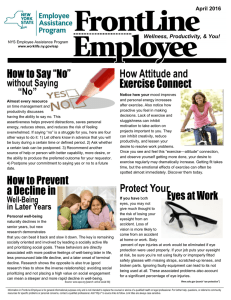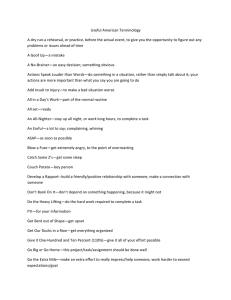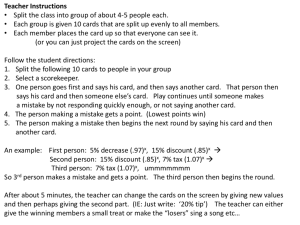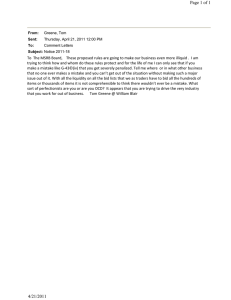In this issue: How Attitude and Exercise Connect IMPACT on Wellness Newsletter
advertisement
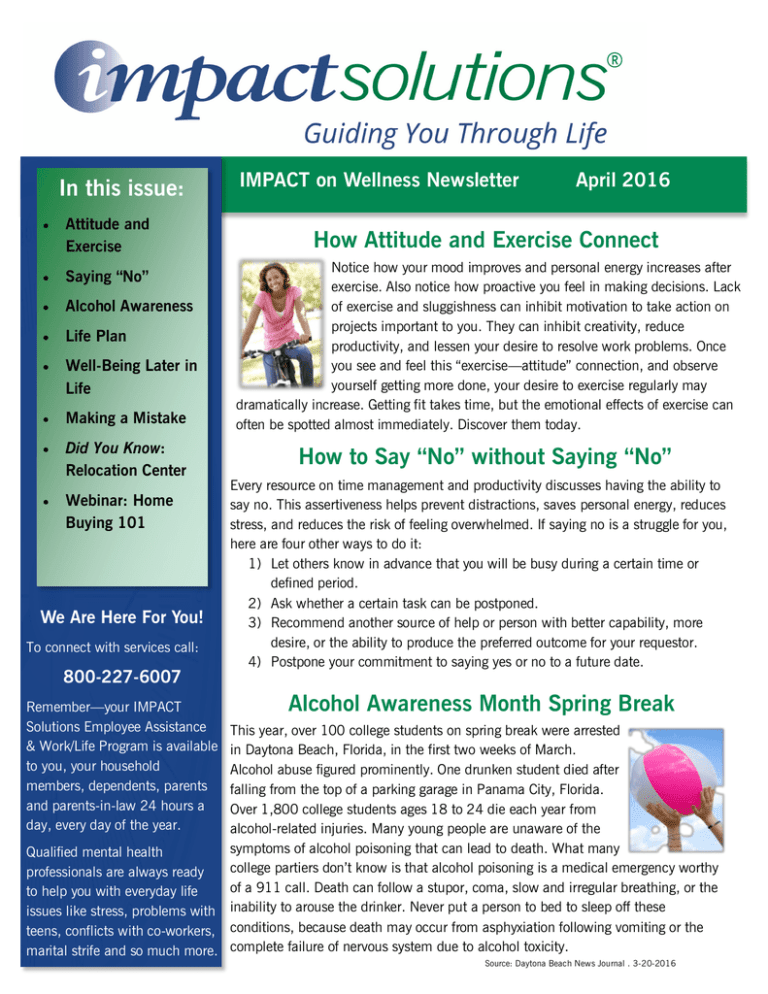
In this issue: Attitude and Exercise Saying “No” Alcohol Awareness Life Plan Well-Being Later in Life Making a Mistake Did You Know: Relocation Center Webinar: Home Buying 101 We Are Here For You! To connect with services call: 800-227-6007 Remember—your IMPACT Solutions Employee Assistance & Work/Life Program is available to you, your household members, dependents, parents and parents-in-law 24 hours a day, every day of the year. IMPACT on Wellness Newsletter April 2016 How Attitude and Exercise Connect Notice how your mood improves and personal energy increases after exercise. Also notice how proactive you feel in making decisions. Lack of exercise and sluggishness can inhibit motivation to take action on projects important to you. They can inhibit creativity, reduce productivity, and lessen your desire to resolve work problems. Once you see and feel this “exercise—attitude” connection, and observe yourself getting more done, your desire to exercise regularly may dramatically increase. Getting fit takes time, but the emotional effects of exercise can often be spotted almost immediately. Discover them today. How to Say “No” without Saying “No” Every resource on time management and productivity discusses having the ability to say no. This assertiveness helps prevent distractions, saves personal energy, reduces stress, and reduces the risk of feeling overwhelmed. If saying no is a struggle for you, here are four other ways to do it: 1) Let others know in advance that you will be busy during a certain time or defined period. 2) Ask whether a certain task can be postponed. 3) Recommend another source of help or person with better capability, more desire, or the ability to produce the preferred outcome for your requestor. 4) Postpone your commitment to saying yes or no to a future date. Alcohol Awareness Month Spring Break This year, over 100 college students on spring break were arrested in Daytona Beach, Florida, in the first two weeks of March. Alcohol abuse figured prominently. One drunken student died after falling from the top of a parking garage in Panama City, Florida. Over 1,800 college students ages 18 to 24 die each year from alcohol-related injuries. Many young people are unaware of the symptoms of alcohol poisoning that can lead to death. What many Qualified mental health college partiers don’t know is that alcohol poisoning is a medical emergency worthy professionals are always ready of a 911 call. Death can follow a stupor, coma, slow and irregular breathing, or the to help you with everyday life issues like stress, problems with inability to arouse the drinker. Never put a person to bed to sleep off these teens, conflicts with co-workers, conditions, because death may occur from asphyxiation following vomiting or the marital strife and so much more. complete failure of nervous system due to alcohol toxicity. Source: Daytona Beach News Journal . 3-20-2016 Writing Your Life Plan Any business will have a better chance of success with a business plan. Should you have a “life plan” for the same reason? A life plan can help you achieve clarity about what you want and make it more likely you’ll achieve the things you desire. And as with a business plan, you can change a life plan at any time. The real value in writing a life plan is taking time to focus and discover. This brings you to what you value most—the “non-negotiable” things you want in your life, such as living near family, owning a home, being near the ocean or mountains, having a spiritual life, or being a parent. These values represent your most precious core beliefs. Next come planning goals and objectives that sync with your values. These may include education, occupational pursuits, leisure, travel, recreational desires, marital plans, children, finance, and retirement goals. Grab a book on creating a life plan from the hundreds of choices you will find either online or offline in a nearby store. Taking the time to create the life you want will lead you to at least one goal almost everyone seeks—peace of mind. How to Prevent a Decline in Well-Being in Later Years How to Survive Admitting a Mistake Personal well-being naturally declines in the senior years, but new research demonstrates that you can beat it back and slow it down. The key is remaining socially oriented and involved by leading a socially active life and prioritizing social goals. These behaviors are directly associated with better late-life wellbeing, less pronounced late-life decline, and a later onset of terminal decline. Research shows the opposite is also true (good research tries to show the inverse relationship): avoiding social prioritizing and not placing a high value on social engagement means a steeper and rapid decline in well-being. Nothing creates a feeling of vulnerability more than admitting to a big mistake at work. In one moment it can feel as though your integrity, job status, reputation, and self-esteem are hanging in the balance. Conquering this fear is not easy, but the payoffs can be significant in elevating your reputation for two reasons. The first is that everyone makes mistakes, and the second is that admitting a mistake creates anxiety and trepidation. Everyone fears admitting to a mistake, so those who do so are often elevated among their peers because they show confidence, strength, and fearlessness. Secondary benefits of admitting a mistake may include relief, empathy from others, closer relationships, forgiveness, and perhaps increased status as the go-to person because of your experience. So admitting a mistake can pay off well, but there is a time erosion factor for which you must be aware. The longer it takes to admit the mistake, and the more defensive you become, the less the payoff. Eventually being forced to admit to a mistake carries the least payoff. Information in IMPACT on Wellness is for general information purposes only and is not intended to replace the counsel or advice of a qualified health professional. You can contact IMPACT Solutions for professional counseling and guidance 24 hours a day at 1-800-227-6007. IMPACT on Wellness is copyright protected by DFA Publishing LLC, 2016. IMPACT SOLUTIONS EMPLOYEE ASSISTANCE & WORK/LIFE PROGRAM Relocation Center FEATURES Articles and tip sheets on mortgages, realtors, and buying vs. renting Financial calculators for home buying affordability and mortgage types Downloadable worksheets on home comparisons and daily expenses Information and resources on new communities Did you Know…IMPACT Solutions has a Relocation Center on the web? Relocation can be stressful! Whether you're moving across the country or just down the street, using professional movers or moving yourself, it can be overwhelming to figure out where to start. IMPACT can be helpful in assisting you with your moving goals through the Relocation Center. The Relocation Center features useful articles and resources on moving in one handy place. Visit the “Centers” section of www.MyImpactSolution.com to access articles , tools and resources on moving, renting, buying or selling a home, and much more. TOLL-FREE: 800-227-6007 WEBSITE: www.MyImpactSolution.com Home Sweet Home TO BUY OR NOT TO BUY? Owning your own home. It’s a dream a lot of people share, but it is right for you? Buying a home may be your largest lifetime purchase, and there is a lot to consider. How much home can you afford? How long do you plan to stay? Are you handy around the house, or will you need to hire professionals? Your Employee Assistance Program can help you find the answers to decide whether to buy or not to buy. ONLINE SEMINAR Available on demand starting April 19th Home Buying 101 Is home ownership right for you? This webinar will explore the advantages and disadvantages of home ownership. Online seminars can be found on your home page, or you can search for them by title. TOLL-FREE: 800-227-6007 WEBSITE: www.MyImpactSolution.com Available anytime, any day, your Employee Assistance Program is a free, confidential program to help you balance your work, family, and personal life. EMPL OYEE ASSISTA NCE PROGRA M APR. 201 6

